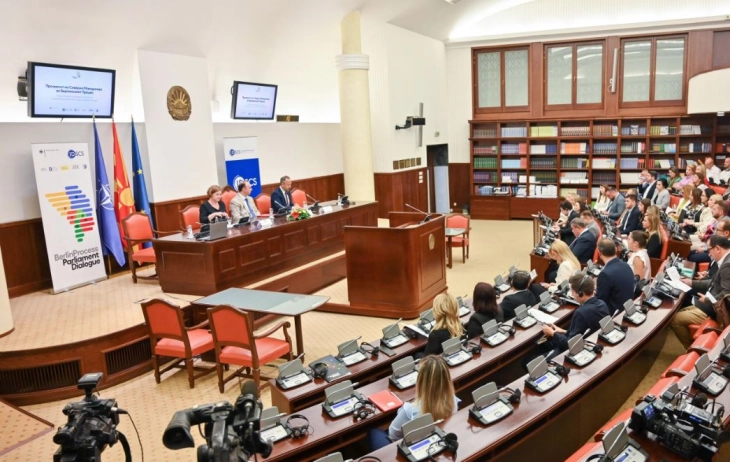IDSCS: Little progress in implementation of common regional market and green agenda within Berlin Process
- Four years after the governments participating in the Berlin Process adopted the action plans on a common regional market and the green agenda, there is little progress. The biggest achievement remains the free roaming in the Western Balkan countries, but it is far from enough to claim that progress has been made, concluded speakers at Wednesday’s presentation of observer reports on the action plans for a common regional market and the green agenda held by Institute for Democracy “Societas Civilis” Skopje (IDSCS) in Parliament.

Skopje, 4 September 2024 (MIA) - Four years after the governments participating in the Berlin Process adopted the action plans on a common regional market and the green agenda, there is little progress. The biggest achievement remains the free roaming in the Western Balkan countries, but it is far from enough to claim that progress has been made, concluded speakers at Wednesday’s presentation of observer reports on the action plans for a common regional market and the green agenda held by Institute for Democracy “Societas Civilis” Skopje (IDSCS) in Parliament.
The head of IDSCS, Marko Troshanovski, said out of the six Western Balkan countries in the Berlin Process (North Macedonia, Albania, Serbia, Bosnia and Herzegovina, Montenegro and Kosovo) Bosnia and Herzegovina remains the biggest problem in the implementation of the agreements. North Macedonia is on a relatively solid level, he stressed.
“The willingness of the countries is partially there, but it is also partially an issue because of the bilateral disputes especially between Serbia and Kosovo, with Bosnia also being somewhat included here since they also make it difficult for these joint benefits to be achieved, since they have to be adopted on a consensual level, to be accepted by everyone so they can function for everyone. This is one more indicator that the governments solely focus on the problems instead of focusing on the solutions that are in our shared interests,” Troshanovski said.

Regarding the action plans on a common regional market and the green agenda adopted in 2021, IDSCS researched Ana Marija Velinovska said most of the activities in terms of digital connectivity and infrastructure have been completed, however, she said there is a lack of implementation of some other key aspects in terms of developing digital skills especially among marginalized groups and cybersecurity among the public administration.
When it comes to the 10-year action plan on the green agenda adopted in 2021, Velinovska said significant implementation isn't expected.
“The emphasis is on the Law on Climate Action which has been in the process of being adopted for two years now and the deadline for the adoption of the law is 2024. It should include several key regulations, bylaws that will cover cutting emissions, realizing the goals we’ve set by 2030 – cutting greenhouse gases by 51 percent. All Western Balkans are in a relatively similar position,” Velinovska said.
Parliament Speaker Afrim Gashi said the parliamentary dimension is of crucial importance to ensuring democratic control, transparency and accountability in the implementation of projects from the Berlin Process.

“The parliaments in all six Berlin Process countries are the real places for discussion of the common challenges and possible solutions... Several successes have been noted in the past decade – agreements reached and concrete projects in various areas as part of the Berlin Process. But the promotion of parliamentary cooperation on a regional level should be an added value in that direction, including cooperation with members of the European Parliament and the national parliaments of the EU member states. This will contribute to an exchange of ideas and experiences meant to raise the quality of legal solutions stemming from the reached agreements, as well as strengthen the supervisory role of MPs in the implementation of the adopted legislation,” Gashi said.

German Ambassador Petra Drexler stressed that the Berlin Process is not an alternative to EU membership, but a driving force meant to enable faster and more specific steps towards European integration as the end goal.
“Regardless of political changes, the commitment of all our countries to the Berlin Process is something that remains constant and the basic factor of this commitment and a decisive factor for the success of this initiative is the inclusion of the national parliaments. The parliamentary dialogue within the Berlin Process provides a unique platform allowing continued connection regardless of changes in personnel. It enables annual meetings during which ideas are launched and decisions are made. It also provides opportunities to see what has been done, and create new ideas and move forward,” Drexler said.
Photo: Parliament







